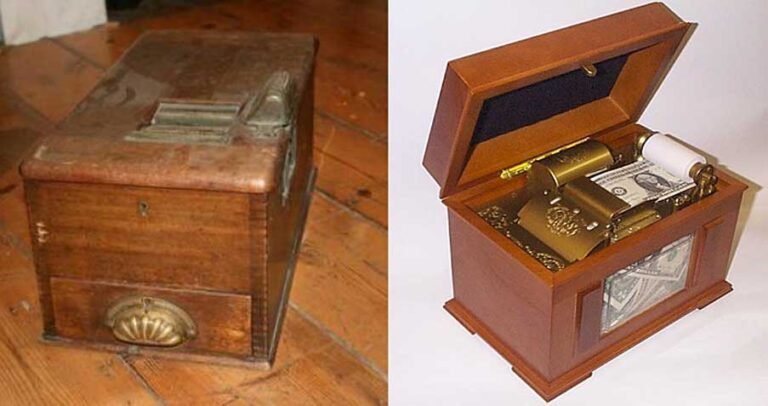by Roy Ratnavel, May 15, 2022
 Some people like to collect coins, first edition stamps, retro comic books or sports memorabilia. I collect spoken words. I hunt and gather these words when I overhear them on the street while watching movies, in my living room via television. These words of the mouth include cultural sayings, turns of phrase, proverbs, quips, and impromptu bon mots that have been uttered over the years.
Some people like to collect coins, first edition stamps, retro comic books or sports memorabilia. I collect spoken words. I hunt and gather these words when I overhear them on the street while watching movies, in my living room via television. These words of the mouth include cultural sayings, turns of phrase, proverbs, quips, and impromptu bon mots that have been uttered over the years.
A friend who worked in law enforcement — more importantly in the financial fraud squad — years ago asked me if I had ever heard of the Rumanian Box. “Never,” I replied. He looked shocked given that I’m in the financial industry, and then said, “You must remember where you came from.” “I do, I said.” He piped up again and said, “The rate among Sri Lankan politicians to create their Rumanian Box is 100 percent.” So, I looked it up.
The legendary Depression-era con man Victor Lustig, who wrote the famous “Ten Commandments for Con Men,” used to sell a money-making machine called the “Rumanian Box.” This was a little machine that a mark would put a blank piece of paper into, only to see real currency come out the other side. The brilliant Lustig sold this Rumanian Box repeatedly for vast sums. ‘Rumanian Box’ became part of my collection of bons mots.

Victor Lustig’s Rumanian Box, Victor Lustig — The Con Man Who Sold Eiffel Tower, Twice (curioustic.com)
But Lustig has been outdone by the modern rulers of Sri Lanka, who managed to manufacture their version of the Rumanian Box. Sri Lankans at large seem to have been the unsuspecting buyers of that Box. At least recent and historic examples show that the Sri Lankan naivety for the catchy epigram, the memorable phrase, especially in politics, is inexhaustible.
The only reason such apathy exists, however, is because there’s still a widespread misunderstanding among the Sinhalese population as to how badly their fellow citizens of the country — the Tamils, are treated, with emphasis on the quotation marks around “badly.” The question every Sinhalese should be asking — as one politician after another, drains money from the system — is this: In an economy as horrible as Sri Lanka’s, which ironically looks like those hollowed-out ghost ships we see on History Channel documentaries like ‘Shipwrecks of the Great Lakes,’ where in hell did the country’s leaders’ eye-popping wealth come from, exactly?
All countries swaddle themselves in myths, and the Sri Lankans are just as self-indulgent as others, but this country houses a vast number of demagogues and many lunatics with the gift for endless hyperbole, hucksterism and a dizzying array of old-school hustles. They are certainly more persuasive and sophisticated than the legendary Depression-era con man Victor Lustig.
Sri Lanka’s ingrained anti-Tamil sentiments and whipped-up nationalist hysteria is a very powerful cement for a most odious system, which makes it easier for the leaders to con their citizenry. The Rajapaksas’ destruction of the Tigers in 2009 allowed them to stay in power for over a decade, winning presidential elections twice with overwhelming Sinhalese support. Sure, mugging the blind is against the law, but it’s also easy. To prevent it, civil society depends, for the most part, not on the police but on civilized people making the conscious decision not to do it.
Con artists have a word for the inability of their victims to accept that they’ve been scammed. They call it the “True Believer Syndrome.” That’s sort of where the Sri Lankans are, in a state of nagging disbelief about the real problem in Sri Lanka. It isn’t so much that Sri Lanka has inadequate rules or incompetent corrupt leaders, although both things are certainly true. The real problem is that it doesn’t matter what rules and regulations are in place if the people running the country are rip-off artists and the citizenry suffers from a pre-existing condition called racial hate.
With such racial hate, the country had become one giant dope house, where a few major players like the Rajapakses extracted the valuables from the race-obsessed people of the country the way junkies share needles. But it is also comforting for many Tamils like me — as we collectively revel in the saying that, “People get the government they deserve.” In that spirit, the Rajapakse years is the best Rumanian Box scam the country has ever seen.
The Germans would call how Tamils feel about the current situation in Sri Lanka, “schadenfreude”: pleasure derived by someone from another person’s misfortune. What Sri Lanka needs is fresh new leaders with unifying ideas to uplift this deeply fractured nation. And those leaders should not be associated with any political dynasty of the past or present.
Sri Lanka is a prime example of why countries like this have not progressed economically and nor evolved politically from the dawn of independence. Since that time, these countries have been governed by leaders with a penchant for redrafting history. It is symptomatic of countries light-years away from attaining true nationhood. In 1948, when Sri Lanka got its independence, it was considered to be the post-colonial nation most likely to succeed economically and democratically. Unfortunately, since then, Sri Lanka has been governed by leaders with racial hatred for Tamils. Through their hatred, they have destroyed the country.
A democratic political system assumes a certain minimum level of ethical behaviour, responsibility and civility on the part of elected government officials that is above what is explicitly spelled out by the constitution. If those ethics are absent — well, democracy just isn’t going to work. In the absence of an overwhelming and fundamental change in Sri Lankan attitude and behaviour, equality of race, religion and gender will never be possible in the country.
The true greatness of a nation — like Singapore — is its willingness to accord all communities status and dignity equal to the majority, to weld those diverse groups into a harmonious polity. Unless, and until Sri Lanka can produce leaders who can realize that truth and are willing to act on it — it will continue to be dismembered by conflict well into the future.
More to the point, the fact that, even after all these misfortune and colossal failures, no one has done much of anything to change the rules and behaviour of the people of Sri Lanka shows that they still don’t get it. Instituting racial dominance and vehement denials of oppression of Tamils regardless of the nasty past is like the addict coming back to the con man to get his lost money back. Sri Lankans must ask themselves how well that ever works out, as they get ready for the reload.
Speaking of ‘the reload,’ bringing Ranil Wickremesinghe back for a sixth term as Sri Lanka PM, with the country mired in political and economic crises, is like rearranging the deck chairs on the Titanic.
Fans of the movie ‘Goodfellas’ will recall Henry Hill — played by Ray Liotta and Tommy DeVito — played by Joe Pesci, taking the same approach to the Bamboo Lounge nightclub they’d been gouging for years. Roll the Ray Liotta narration: “Finally, when there’s nothing left, when you can’t borrow another buck . . . you bust the joint out. You light a match.”
Sri Lanka is the current-day Bamboo Lounge!